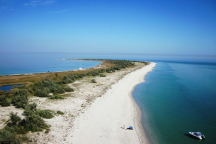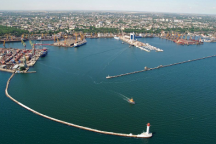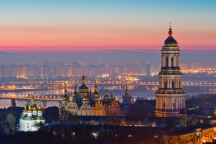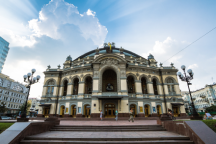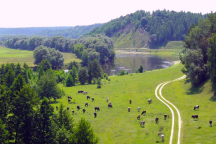Ukrainian Cinema
2020-2021
Introduction
Consistent with events affecting the film industry worldwide, the Ukrainian film market has just experienced a rough couple of years. The Covid-19 pandemic put a pause to what was an uneasy market development process locally, with Ukrainian cinemas closing for several months during 2020 and resulting in unsustainable and unsteady box-office receipts.
With TV producers now directly involved in Ukrainian politics at the highest levels, cultural policy priorities relating to the film industry have been affected substantially. The president of Ukraine, Volodymyr Zelenskiy, is a successful television producer and comedian. His chief-of-staff, Andriy Ermak, was a TV and film producer, and Minister of Culture Oleksander Tkachenko was an executive producer at 1+1 Media, one of the nation’s largest media companies. The effect on Ukrainian film and television production is measurable; mainstream cinema projects and television productions by local media outlets targeting a broad audience are awarded double the amount of state financial support when compared to independently produced projects, documentaries, and debut productions.
Maryna Kuderchuk, the new head of the Ukrainian State Film Agency, fully supports the current policy direction, as do her subordinates. Despite the obstacles of reduced State funding and the pandemic lockdown, film production continued, if in a reduced capacity. Productions went on pause during the first lockdown—March through May 2020—but during the second lockdown, special safety measures were put in place to safeguard crew members, and local administrations issued permits for film projects.
Local movie theaters largely survived the pandemic, but saw their market reduced by half compared to March 2020. there was State support for cinemas, though the process of obtaining it was anything but smooth.
Apart from Covid-related issues, several other major changes have affected the Ukrainian film industry over the last two years:
- the introduction of State support for project development. The Ukrainian Cultural Foundation has begun providing production-stage grants, and the Ukrainian State Film Agency is currently in the process of adapting existing legislation in order to award production-stage financial grants.
- A cash-rebate system of 20%+5% was launched in Ukraine and several projects successfully launched their productions as a result.
Ultimately, the effect of these changes will be seen only in 3-5 years. In the immediate future, several prominent Ukrainian independent film productions will premiere as official selections at major film festivals. Meanwhile, the production process will continue to adjust to the new reality of the cash rebate system—depending, certainly, on the successful collaboration between the Ukrainian State and foreign productions.
Ukraine: Basic data
Film in Ukraine
State Support
State support procedures in Ukraine have changed a little since 2018.
The sphere is currently not over-regulated. Recent legislation entitled "On State Support of Cinema" regulates the industry. According to the legislation, the chief State institute overseeing film continues to be the Ukrainian State Film Agency. There is currently also a Council for State Support of Cinema made up of nine members from different fields of the film industry. This Council is vested with final authority in deciding which film projects will receive support, decisions which are informed by an expert project evaluation process.
Under current policy, international production companies are eligible to apply for State funding in Ukraine for projects with a Ukrainian co-producer.
State support is granted on a competitive basis: the Ukrainian State Film Agency announces open calls with pitching sessions two or three times per year.
Thus, a film producer can get:
- up to 100% state support for documentary, educational, animated, independent and debut films;
- up to 80% support for a feature or documentary (a condition of eligibility is the confirmation of the remaining 20% of funding);
- up to 50% for TV films and series (with confirmation of the remaining 50%).
All co-productions in Ukraine conform to the European Convention on Cinematographic Co-Production.
State support for films, $
Ukraine produced releases
In 2020-2021, several Ukrainian feature films were selected for world film festivals:
- The Earth Is Blue as an Orange by Iryna Tsilyk, a Ukraine / Lithuania documentary co-production--received a Directing Award in the World Cinema Documentary at Sundance in 2020;
- Bad Roads by Nataliya Vorozhbyt, her first feature--received a Verona Film Club Award at Venice International Film Critics' Week in 2020;
- Blindfold a feature film by Taras Dron' won the Competition 1-2 at the Warsaw International Film Festival in 2020;
- This Rain Will Never Stop by Alina Gorlova, a Ukraine/ Latvia / Germany / Qatar documentary co-production, received a First Appearance prize at IDFA in 2020;
- Stop-Zemlia by Kateryna Gornostai, her first feature received the Crystal Bear for the Best Film at Generation14 at Berlinale in 2021;
- Reflection by Valentyn Vasyanovych was selected for the 2021 Venice Film Festival Competition;
- Rhino by Oleh Sentsov, a Ukraine / Germany / Poland co-production, has been selected for the Orizzonti competition at the 2021 Venice film festival;
- 107 Mothers by Peter Kerekes, a Slovak Republic / Czech Republic / Ukraine co-production, is selected for the Orizzonti competition at the 2021 Venice Film Festival.
Co-production possibilities
The Ukrainian system of State support includes a separate section for co-produced projects presented at pitching sessions. To be eligible for state support for a project in Ukraine, the project is required to have a Ukrainian producer partner.
In 2004, Ukraine joined the European Convention on Cinematographic Co-Production.
In 2020, Ukraine joined Eurimages.
- Rhino by Oleh Sentsov, Ukraine, Germany, Poland (awarded €270,000 with a total production budget of €1,6 mln) in 2020;
- Spas by Maksym Nakonechnyi, Ukraine, Czech Republic, Hungary (awarded €125,000 with a total production budget of €463,776) in 2020;
- The Editorial Office by Roman Bondarchuk, Ukraine, Germany (awarded €140,000 with a total production budget of €792,486) in 2021.
Also, one minority co-production project received support from Eurimages in 2020: The Long Run (Italy / Ukraine) by Andrea Magnani was awarded €180,000 with a total production budget of €1,8 MM.
Cash rebates in Ukraine
The cash rebate program in Ukraine was launched in 2020.
Non-Ukrainian production companies are eligible for cash rebates making such kind of films:
- Feature film: >74 min
- Animation: >74 min
- Documentary: >52 min
- TV (animation) series: >40 min/episode
Productions are eligible for refunds up to 25% of the qualified costs for producing films in Ukraine. 5% may be added if a project satisfies at least four points of a cultural test or, if the proposed film includes not less than 5% of screen time with scenes involving the reading or featuring of Ukrainian books; is based on a book by a Ukrainian author; or depicts the current war in the Donbas.
The Last Mercenary, a Netflix action film featuring Jean-Claude Van Damme, was shot in Ukraine in part because of the cash rebate program. Canal+ shot several episodes of its new TV series Infinity in Ukraine, also exploiting the cash rebate program.
Co-production possibilities
To date, Ukraine has ratified five international normative legal acts in the field of film co-production:
- Agreement on Cooperation in the Field of Cinematography with Azerbaijan, Armenia, Belarus, Georgia, Moldova, Tajikistan, Kyrgyzstan, Kazakhstan, the Russian Federation, and Uzbekistan (in effect as of May 5, 1995);
- European Convention on Cinematographic Co-Production (in effect in Ukraine as of December 1, 2009);
- Co-production Treaty between the Cabinet of Ministers of Ukraine and the Government of the French Republic (in effect as of June 25, 2012);
- Agreement on Film Co-production and Cooperation between the Cabinet of Ministers of Ukraine and the Government of the State of Israel on the joint production of films (in effect as of May 15, 2017);
- Audiovisual Coproduction Treaty between the Cabinet of Ministers of Ukraine and the Government of Canada (in effect as of January 1, 2021).
Ukrainian film market overview
As of August 2021, there are 623 screens in Ukraine*. The majority of these are part of multiplexes in shopping malls located in big cities, resulting in a theater network that doesn't reach deep into outlying regions.
The Multiplex network currently controls the largest number—nearly 25%, or 28 cinema halls and 158 screens—of national venues. The second largest share is held by Planeta Kino with 9 cinema halls and 68 screens*.
As of this date, Ukraine has yet to introduce a digital ticketing system, thus data provided by distributors, cinema halls, and the State Film Agency may be incomplete, and is derived from fragmented, unsystematized sources regarding the amount of cinemas, box office receipts, and audience size.
With the onset of the Covid-19 pandemic and resulting lockdowns in 2020, cinema halls in Ukraine saw their profits slashed, with many closing temporarily in anticipation of a restored market. Despite this, the Ukrainian government managed to distribute 590 MM UAH ($21,9 MM) in institutional grants to Ukrainian cultural institutions, artists, and creative industries including cinemas.
In addition, the cinema network within the country continued to grow; in 2019, there were 580 screens in Ukraine, and in 2020, 623).
*According to information provided by the Kinomania distribution company.
Box office, $ MM
Avg. cinema ticket price, $
Admissions, MM
Top-10 non-Ukrainian films in box-office, 2020*:
dir. Guy Ritchie:
dir. Stephen Gaghan:
Adil El Arbi:
dir. Christopher Nolan:
dir. Jeff Fowler:
dir. Jake Kasdan:
dir. Paul Feig:
dir. Ric Roman Waugh:
dir. Chris Sanders:
Top-10 Ukrainian films in box-office, 2020*:
dir. Antonio Lukich:
dir. Volodymyr Tykhyi:
dir. Timur Yaschenko:
dir. Serge Vane:
dir. Khrystyna Syvolap:
dir. Oleksandr Bieliak:
dir. Oleksandr Ityhilov:
dir. Valentyn Vasyanovych:
dir. Alex Zaporoshchenko:
Streaming services
The largest Ukrainian streaming services are Megogo, Sweet.tv, Oll.tv, and Volia. Of these, some provide their service throughout the former USSR. Two mobile providers—Kyivstar and Lifecell—also offer streaming services.
In contrast to the European and Northern American market Ukrainian streaming services are growing slowly. The pandemic and lockdown offered a slight bump in streaming subscriptions, but growth has since returned to pre-pandemic levels.
Accurate numbers of streaming service subscribers have not been published.
According to expert analysis, the primary Ukrainian audience continues to consume its content linearly, accustomed as it is to TV programming. This results in TV channels remaining as the the most popular content on streaming services.
The number of viewers watching specialized cinema channels or single films on streaming outlets is quite small. Film producers and distributors cannot depend on significant revenues from content released on Ukrainian streaming services. In addition, the Ukrainian audience is indifferent to issues of picture and sound quality, being primarily concerned with content trending locally.
There are, however, examples of heightened interest by the Ukrainian audience in a single films made available via streaming. These were local films that enjoyed good word-of-mouth and which were streaming exclusively on one service. For example, the tragicomedy My Thoughts Are Silent by Ukrainian director Antonio Lukich was a hit on streaming where it was released digitally immediately following the start of the lockdown. The buzz was still strong for this film released in theaters at the beginning of January 2020.
In regard to the production of original content, Ukrainian streaming services are taking a cautious approach, budgeting conservatively, aware that Ukrainian audiences prefer watching linearly programmed content. In response, some services have begun producing original content, proceeding independently or in cooperation with large, established productions. Several services have begun planning to invest in the creation of series and films.
In addition to Ukrainian streaming services, international providers are also active on the market including Netflix, Amazon Prime, Apple+, Dazn, Mubi, and others. In addition, Netflix regularly provides Ukrainian subtitles and voiceovers for some films and series made available in Ukraine. Streaming services don't routinely make their audience statistics public, but expert evaluation has demonstrated that local streaming services enjoy greater popularity than do international streaming providers.
Ukrainian film festivals and conferences
Ukraine plays host to several large film festivals that present feature films, documentaries, and animated films, and which offer industry programs and film markets. There are also many smaller film festivals specializing in independent cinema and regional film festivals for the local audiences.
Since 2014, significant emphasis has been placed on the development of industrial aspects of the film festival and today, nearly every Ukrainian film festival runs an industry-focused program providing networking, pitching, and learning opportunities for film professionals.
Due to the pandemic, in 2020-2021, some festivals pushed back the date of their programs, and embracing online or hybrid formats for screenings and professional meetings. Overall, every major Ukrainian film festival survived the period and managed to adapt to new digital realities.
 Ukraine’s longest running film festival is the
Molodist Kyiv International Film Festival,
established in 1970. The event focuses on debut and student films, maintains an
international co-production market--Boat Meeting—and is the only
festival to include an LGBTQ+ competition.
Ukraine’s longest running film festival is the
Molodist Kyiv International Film Festival,
established in 1970. The event focuses on debut and student films, maintains an
international co-production market--Boat Meeting—and is the only
festival to include an LGBTQ+ competition.
 The Odesa International Film Festival
boasts an extensive industrial program. In 2020, the
entire festival was held online, and in 2021 only national competition categories were
included. This year’s professional program included presentations of Ukrainian projects
seeking international partnerships.
The Odesa International Film Festival
boasts an extensive industrial program. In 2020, the
entire festival was held online, and in 2021 only national competition categories were
included. This year’s professional program included presentations of Ukrainian projects
seeking international partnerships.
 The most significant Ukrainian documentary film festival, Docudays UA, focuses on human
rights. It was among the first festivals to successfully switch to an online format during
the pandemic. Docudays UA also held an industry program aimed at the presentation and
support of documentary projects.
The most significant Ukrainian documentary film festival, Docudays UA, focuses on human
rights. It was among the first festivals to successfully switch to an online format during
the pandemic. Docudays UA also held an industry program aimed at the presentation and
support of documentary projects.
 Regarding professional conferences, Kyiv Media Week is one of the largest events of its kind
for the film, TV, and media industries in Ukraine. Established in 2011, the event organizes
conferences, panel discussions, and B2B meetings for professionals from Ukraine and 35
international markets. KMW focuses on wide range of media business fields including cinema,
TV, series, animation, digital, policies, and more.
Regarding professional conferences, Kyiv Media Week is one of the largest events of its kind
for the film, TV, and media industries in Ukraine. Established in 2011, the event organizes
conferences, panel discussions, and B2B meetings for professionals from Ukraine and 35
international markets. KMW focuses on wide range of media business fields including cinema,
TV, series, animation, digital, policies, and more.
Production in Ukraine: facilities
There are currently more than 50 modern and professionally equipped studios and sound stages in Ukraine. In Kyiv, there are more than 30 sound stages with 200 to 2500 m2 of studio space.
Additional facilities in Ukraine include:
- Film studios with exterior locations and backlots.
- A considerable pool of stage props and decorations.
- Rental houses.
For post-production requirements, there are 40 specialized studios in Ukraine, providing CG/VFX supervisors and a full range of services in animation and post-production.





Production in Ukraine: locations
- The film commissions in Ukraine provide information and details about locations for filming in Ukraine. Their contact information is available at industry guide in the Film Institutions and Organizations section.
- A catalog of filming locations in Ukraine is also available. Arranged by the Ukrainian Motion Picture Association, the catalog includes a listing of locations in natural, urban, industrial, and historical/cultural settings within Ukraine.






